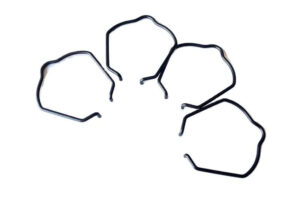Music Wire Wire Forming
 Music Wire Wire Forming is a wire forms which made in music wire.Music wire is predominantly made of high-carbon steel, containing substantial amounts of carbon and manganese. This blend provides the wire with its notable tensile strength and elasticity. The standard specification for music wire is ASTM A228, outlining its chemical composition and mechanical characteristics to ensure uniformity in different applications. Despite variations in wire diameter, the material adheres to strict quality standards for consistency and longevity.
Music Wire Wire Forming is a wire forms which made in music wire.Music wire is predominantly made of high-carbon steel, containing substantial amounts of carbon and manganese. This blend provides the wire with its notable tensile strength and elasticity. The standard specification for music wire is ASTM A228, outlining its chemical composition and mechanical characteristics to ensure uniformity in different applications. Despite variations in wire diameter, the material adheres to strict quality standards for consistency and longevity.
Properties and Features of Music Wire
Music wire, especially in ASTM A228 grade, is recognized for its exceptional tensile strength and resistance to fatigue, making it suitable for springs exposed to repetitive loading cycles. Key mechanical properties include:
• Tensile Strength: Ranging from 230,000 to 399,000 psi, depending on wire diameter.
• Elasticity: High modulus of elasticity enables the wire to return to its original form after significant deformation.
• Hardness: Typically falls between 40 and 55 HRC, based on the tempering process.
• Density: Approximately 7.85 g/cm³.
• Modulus of Elasticity (E): 30,000,000 psi.
• Modulus of Rigidity (G): 11,500,000 psi.
• Corrosion Resistance: While not inherently corrosion-resistant, music wire can undergo coating or treatment to enhance its resistance in specific environments.
Applications of Music Wire in Springs and Wire Forms
Music wire finds broad application in various types of springs, including:
• Compression Springs
• Counter Balance Springs
• Clock Springs
• Die Springs
• Extension Springs
• Flat Springs
• Torsion Springs
Moreover, music wire is extensively used across diverse industries:
• Aerospace: Control mechanisms and vibration damping systems.
• Agriculture: Equipment mechanisms employing springs.
• Automotive: Valve and suspension assemblies.
• Defense: Springs for high-reliability mechanisms.
• Industrial: High-strength springs in tools and equipment.
• Medical: Precision springs for devices necessitating accurate force control.
For further insights into spring applications in different sectors, explore “From Automotive to Aerospace: Applications of Springs in Different Industries.”
Advantages and Limitations of Music Wire
Advantages:
• High tensile strength and fatigue resistance.
• Excellent elasticity for maintaining shape under stress.
• Readily available and cost-effective for a wide range of applications.
Limitations:
• Lack of inherent corrosion resistance, necessitating protective coatings or treatments for humid or corrosive conditions.
• Limited temperature tolerance before compromising mechanical properties.
Custom Music Wire Wire Forming
|
Item
|
Custom design wire bending (also called wire forming)
|
|
Style
|
Cylinder, Flatten, Rounded, Customized
|
|
Material
|
Spring steel (SWC), Music wire(SWP),Alloy steel,Mild-carbon steel,
72A,65Mn and so on
|
|
Sample
|
available
|
|
Wire diameter
|
from 0.1 to 11.0 mm
|
|
Type
|
Compression; Torsion; Extension springs; CNC Machining…
|
|
Surface treatment
|
Electronic Zinc or Nickel plating, Alkaline blackening,Dacromet,Oil coating,
Copper plating, Sand blasting, Passivation, Polishing, and so on
|
|
Size
|
Customer Order
|
|
MOQ
|
It depends,Small order are acceptable
|
|
Packing
|
Box Packing+carton+pallets
|






